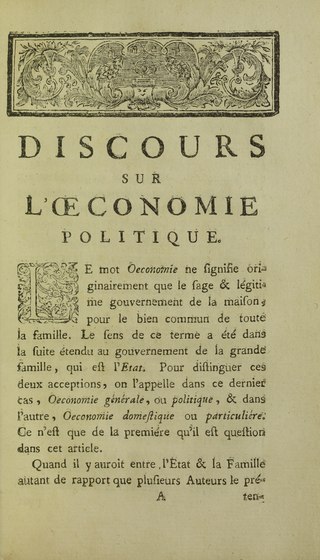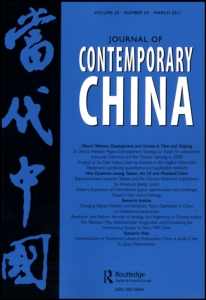
Political economy is a branch of political science and economics studying economic systems and their governance by political systems. Widely studied phenomena within the discipline are systems such as labour markets and financial markets, as well as phenomena such as growth, distribution, inequality, and trade, and how these are shaped by institutions, laws, and government policy. Originating in the 16th century, it is the precursor to the modern discipline of economics. Political economy in its modern form is considered an interdisciplinary field, drawing on theory from both political science and modern economics.
In economics, industrial organization is a field that builds on the theory of the firm by examining the structure of firms and markets. Industrial organization adds real-world complications to the perfectly competitive model, complications such as transaction costs, limited information, and barriers to entry of new firms that may be associated with imperfect competition. It analyzes determinants of firm and market organization and behavior on a continuum between competition and monopoly, including from government actions.
This aims to be a complete article list of economics topics:

In the economics study of the public sector, economic and social development is the process by which the economic well-being and quality of life of a nation, region, local community, or an individual are improved according to targeted goals and objectives.

William Jack Baumol was an American economist. He was a professor of economics at New York University, Academic Director of the Berkley Center for Entrepreneurship and Innovation, and Professor Emeritus at Princeton University. He was a prolific author of more than eighty books and several hundred journal articles. He is the namesake of the Baumol effect.
National accounts or national account systems (NAS) are the implementation of complete and consistent accounting techniques for measuring the economic activity of a nation. These include detailed underlying measures that rely on double-entry accounting. By design, such accounting makes the totals on both sides of an account equal even though they each measure different characteristics, for example production and the income from it. As a method, the subject is termed national accounting or, more generally, social accounting. Stated otherwise, national accounts as systems may be distinguished from the economic data associated with those systems. While sharing many common principles with business accounting, national accounts are based on economic concepts. One conceptual construct for representing flows of all economic transactions that take place in an economy is a social accounting matrix with accounts in each respective row-column entry.
International economics is concerned with the effects upon economic activity from international differences in productive resources and consumer preferences and the international institutions that affect them. It seeks to explain the patterns and consequences of transactions and interactions between the inhabitants of different countries, including trade, investment and transaction.
Articles in economics journals are usually classified according to JEL classification codes, which derive from the Journal of Economic Literature. The JEL is published quarterly by the American Economic Association (AEA) and contains survey articles and information on recently published books and dissertations. The AEA maintains EconLit, a searchable data base of citations for articles, books, reviews, dissertations, and working papers classified by JEL codes for the years from 1969. A recent addition to EconLit is indexing of economics journal articles from 1886 to 1968 parallel to the print series Index of Economic Articles.

The Pakistan Institute of Development Economics is a post-graduate research institute and a public policy think tank located in the vicinity of Islamabad, Pakistan.

Mahmoud Mohieldin, is an economist with more than 30 years of experience in international finance and development. He is the UN Climate Change High-Level Champion for Egypt. He is an Executive Director at the International Monetary Fund. He has been the United Nations Special Envoy on Financing the 2030 Sustainable Development Agenda since February 2020. He was the Minister of Investment of Egypt from 2004-2010, and most recently, served as the World Bank Group Senior Vice President for the 2030 Development Agenda, United Nations Relations and Partnerships. His roles at the World Bank also included Managing Director, responsible for Human Development, Sustainable Development, Poverty Reduction and Economic Management, Finance and Private Sector Development, and the World Bank Institute; World Bank President's Special Envoy on the Millennium Development Goals (MDGs), the Post-2015 Development Agenda, and Financing for Development; and Corporate Secretary and Executive Secretary to the Development Committee of the World Bank Group's Board of Governors. Dr Mohieldin also served on several Boards of Directors in the Central Bank of Egypt and the corporate sector. He was a member of the Commission on Growth and Development and was selected for the Young Global Leader of the World Economic Forum in 2005. His professional experience extends into the academic arena as a Professor of Economics and Finance at the Faculty of Economics and Political Science, Cairo University and as a Visiting Professor at several renowned Universities in Egypt, Korea, the UAE, the UK and the USA. He is a member of the International Advisory Board of Durham University Business School. He also holds leading positions in national, regional and international research centres and associations. He has authored numerous publications and articles in leading journals in the fields of economics, finance and development.
Cultural economics is the branch of economics that studies the relation of culture to economic outcomes. Here, 'culture' is defined by shared beliefs and preferences of respective groups. Programmatic issues include whether and how much culture matters as to economic outcomes and what its relation is to institutions. As a growing field in behavioral economics, the role of culture in economic behavior is increasingly being demonstrated to cause significant differentials in decision-making and the management and valuation of assets.

Financial Markets and Portfolio Management (FMPM) is a journal publishing original research and survey articles in all areas of finance, especially in financial markets, portfolio theory, wealth management, asset pricing, risk management, and regulation. Its principal objective is to serve as a bridge between innovative research and practical application. The readers of the journal are researcher, economists, asset managers, financial analysts, and other professionals in finance and related areas.
Public economics(or economics of the public sector) is the study of government policy through the lens of economic efficiency and equity. Public economics builds on the theory of welfare economics and is ultimately used as a tool to improve social welfare. Welfare can be defined in terms of well-being, prosperity, and overall state of being.

The following outline is provided as an overview of and topical guide to economics:
American Literature is a literary journal published by Duke University Press. It is sponsored by the American Literature Section of the Modern Language Association. The current editors are Priscilla Wald and Matthew A. Taylor. The first volume of this journal was published in March 1929. Founders include Fred Lewis Pattee, among others.
The International Journal of Theoretical and Applied Finance (IJTAF) was founded in 1998 and is published by World Scientific. The journal spans a wide range of topics focussing on the use of quantitative tools in finance, including articles on development and implementation of mathematical models, their industrial usage, and application of modern stochastic methods.
Colm Kearney (1954–2018) was an Irish economist and academic, who was dean of the Faculty of Business and Economics at Monash University, Melbourne, Australia, until 2017, shortly before his death on 28 March 2018.

The Journal of Contemporary China is a multidisciplinary peer-reviewed academic journal on contemporary Chinese affairs. It is published five times per year by Routledge and covers issues such as Chinese politics, law, economy, culture, and foreign policy, among others. It is purported to be the only English-language journal edited in North America that provides exclusive information about contemporary Chinese affairs for scholars, business people and government policy-makers.

Research Policy is a monthly peer-reviewed academic journal published by Elsevier on behalf of the Science Policy Research Unit. It was established by British economist Christopher Freeman in 1971 and is regarded as the leading journal in the field of innovation studies. It is listed as one of the 50 journals used by the Financial Times to compile its business-school research ranks.









